Social-Political Issues
 |
 |
 |
 |
 |
 |
 |
Basics on the European Union – VI
German Elections & the European Crisis Point
On September 24, 2017, Germany, the most populous and powerful nation of Europe, held federal elections. Hardly could the results have been more disruptive. In a country where elections are a sedated affair and where Angela Merkel slides into no less than 3 previous terms without trouble, the main German parties have hemorrhaged massive support to the previously powerless German conservative party known as the AFD (Alternative für Deutschland or Alternative for Germany).
From no standing in Parliament, the AFD now has leapfrogged to the third largest presence in the House of Representatives – Bundestag.
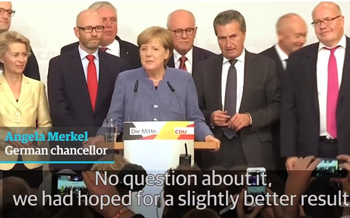 Merkel has still won the election, but her iron grip on the Parliament has been lost. Now, she is left to cobble together an alliance between herself and all the other German parties if they hope to neutralize the AFD.
Merkel has still won the election, but her iron grip on the Parliament has been lost. Now, she is left to cobble together an alliance between herself and all the other German parties if they hope to neutralize the AFD.
The political scene has taken on a dramatically different turn. As recently as this past Friday, November 17th, the coalition talks failed. Germany must face new attempts at a coalition, proceed under a minority government forced to cut deals at every turn, or stand the risk of a new election that could favor the waxing AFD.
In the wake of German political chaos, France is stepping forward, not so much as the engine than the driver. Right when German stability begins to shake, Macron enters the scene to continue the push for a European integration. Without the economic power wielded by Germany, France under Macron nonetheless has the political will to move the desired Union forward.
German false-right
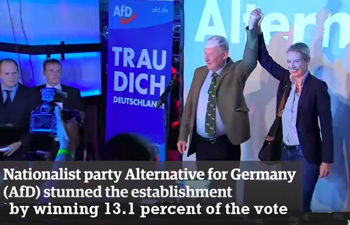 Though the German establishment is shuddering under the presence of the AFD, it must be stated that the AFD is not a genuinely traditional party so much as it is a reaction against the perceived loss of the modern German way of life. While supporting good positions, such as at least a partial opposion to same-sex “marriage” and leaning toward a position against abortion, the AFD openly advertises that they reject burqas in favor of bikinis. They continue the open embrace of the broken morality of the West.
Though the German establishment is shuddering under the presence of the AFD, it must be stated that the AFD is not a genuinely traditional party so much as it is a reaction against the perceived loss of the modern German way of life. While supporting good positions, such as at least a partial opposion to same-sex “marriage” and leaning toward a position against abortion, the AFD openly advertises that they reject burqas in favor of bikinis. They continue the open embrace of the broken morality of the West.
In many ways it is akin to the Americans who desire a return to the 1950s. Surely, it was a time better than the 2000s, but one still entrenched in the Cultural Revolutions of the 20th century that led to our modern crisis.
The left reacts
To demonstrate the maturity of the political establishment in coping with these newcomers, one need only look to the examples. The treatment received by the AFD betrays the severe hypocrisy of a system that has until now been masked under the placid stream of uniformity in all but name.
In the face of AFD friction, the German incumbents are closing ranks and doing everything they can to mitigate the influence of their elected enemies. The protocol governing the inner workings of government, the nuts and bolts of how it functions, are literally being re-written in a puerile attempt to mitigate the AFD voice. This shameless illiberality of the “liberal” parties thus reveals its own hypocrisy.
The following are but a few examples: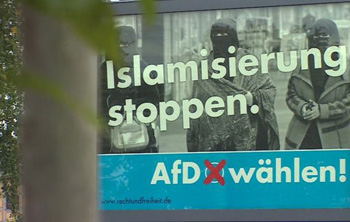 In addition to these blatant malfeasances, there are countless examples of actions based on sheer pettiness, with AFD members being shunned, insulted and snubbed by other members of
Bundestag. Despite the political tricks and personal affronts being perpetrated by the liberals, it is the AFD that is accused of Nazism, as if opposition to unrestricted migration is equitable to machine guns and middle-of-the-night assassination of political opponents.
In addition to these blatant malfeasances, there are countless examples of actions based on sheer pettiness, with AFD members being shunned, insulted and snubbed by other members of
Bundestag. Despite the political tricks and personal affronts being perpetrated by the liberals, it is the AFD that is accused of Nazism, as if opposition to unrestricted migration is equitable to machine guns and middle-of-the-night assassination of political opponents.
Dissent has brought out the ruling parties true colors. The establishment’s threat is clear: “it doesn’t matter who you are, if you’re not with the left, you’re a Nazi.”
The treatment and rule-twisting employed by the incumbent German parties betrays such indefensible small-mindedness that even some of the liberal caste are fearing it will make martyrs of the AFD.
Implications for the EU
While Germany descends into desperate squabbles over how to contain the AFD, the young and energetic president of France has quickly stepped up, ready to guide the political agenda of the European Union. Whereas Germany remains the financial engine that keeps the EU floating, Macron is seeking to increasingly take the helm in terms of ideology and the directing of Europe towards a centralized federation.
As Merkel trips on internal oppositions, Macron steps forward as the new spokesman for the EU, announcing bold plans for a single European tax and a single set of European corporate laws. The EU’s founding members, France and Germany, must unite to push forward this radical agenda, lest the European dream be derailed by nationalists. This is Macron’s message.
Germany becomes the horse and France becomes the driver. The rest of Europe is set to be dragged along in the cart. Any European nation that doesn’t go willingly, Macron has stated, will have its aid from Brussels cut. It is blatant economic coercion; the carrot and the stick. A ludicrous irony: Macron aspires to ever greater heights of integration right when the powerhouse of Europe is trembling.
The sick man is Europe
The trouble afflicting Europe is the result of a long-ignored disease that today has reached significant development. As symptoms of a virus only manifest themselves well after the infection takes root, so too the reaction of the German population against the diktats of Merkel’s government has only occurred now that the European situation has become more palpably serious.
With Merkel’s weakening power, the Europe crisis is coming to a head. No longer can Europe be sleepily dragged into a tightening noose of integration. To face the many crises of the modern day, Europe will have to fall one way or another: either by reclaiming national sovereignty and loosening the Union or by integrating into the European Super-State envisioned by Macron.
Double standard democracy
In Eastern Europe, Hungary and Poland are condemned as “illiberal democracies,” supposedly violating the “rule of law” for passing laws that give more power to the government; yet at the same time the brutal suppression of the independence referendum in Catalonia is ignored. In a referendum that could potentially destabilize the European push for integration by encouraging other small European nationalities to separate, Catalonians have been savagely repressed by government forces.
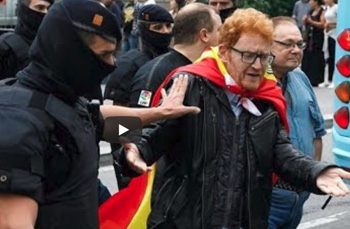 Spain funneled police and military to violently crush the peaceful attempt to simply decide on Catalonian independence, and the EU remains silent. Poland, Hungary and the Czech Republic respect their citizens’ demands by refusing to accept Muslim migrants and, because of this, the EU launches a legal assault against them. Poland is even in danger of losing its vote as a member State if it continues with a judiciary reform deemed “undemocratic” by Brussels, yet the brutal suppression of merely voting in Catalonia is not spoken of.
Spain funneled police and military to violently crush the peaceful attempt to simply decide on Catalonian independence, and the EU remains silent. Poland, Hungary and the Czech Republic respect their citizens’ demands by refusing to accept Muslim migrants and, because of this, the EU launches a legal assault against them. Poland is even in danger of losing its vote as a member State if it continues with a judiciary reform deemed “undemocratic” by Brussels, yet the brutal suppression of merely voting in Catalonia is not spoken of.
Catalonian politicians are sacked, the police are taken over by control from Madrid, and the elected President of Catalonia flees to Belgium, yet the hollow call of European democracy still resounds through the corrupt corridors of many of the EU’s power capitals.
Macron calls for a more democratic Europe, while women have their fingers broken by armed police in Catalonia for approaching a voting booth. “Democracy” in Europe is merely a word and it hinges on whether you stand with the current political system or not.
Continued

From no standing in Parliament, the AFD now has leapfrogged to the third largest presence in the House of Representatives – Bundestag.

A bitter win for Merkel
The political scene has taken on a dramatically different turn. As recently as this past Friday, November 17th, the coalition talks failed. Germany must face new attempts at a coalition, proceed under a minority government forced to cut deals at every turn, or stand the risk of a new election that could favor the waxing AFD.
In the wake of German political chaos, France is stepping forward, not so much as the engine than the driver. Right when German stability begins to shake, Macron enters the scene to continue the push for a European integration. Without the economic power wielded by Germany, France under Macron nonetheless has the political will to move the desired Union forward.
German false-right

A surprise surge of support for the opposition AFD
In many ways it is akin to the Americans who desire a return to the 1950s. Surely, it was a time better than the 2000s, but one still entrenched in the Cultural Revolutions of the 20th century that led to our modern crisis.
The left reacts
To demonstrate the maturity of the political establishment in coping with these newcomers, one need only look to the examples. The treatment received by the AFD betrays the severe hypocrisy of a system that has until now been masked under the placid stream of uniformity in all but name.
In the face of AFD friction, the German incumbents are closing ranks and doing everything they can to mitigate the influence of their elected enemies. The protocol governing the inner workings of government, the nuts and bolts of how it functions, are literally being re-written in a puerile attempt to mitigate the AFD voice. This shameless illiberality of the “liberal” parties thus reveals its own hypocrisy.
The following are but a few examples:
- The rules of the Bundestag were re-written so that the opening speech is given by the longest standing member instead of the oldest by age. This denied the 77-year-old AFD member Wilhelm von Gottberg from making the address and gives the stand instead to Merkel’s favorite erstwhile finance minister Wolfgang Schäuble. The latter has resigned his post as finance minister and been asked to arbitrate the Bundestag meetings, an attempt by Merkel to put her most experienced man at the helm to try and keep the AFD under control.(1)
- Government committee regulations are being changed to give non-majority parties 1 member instead of proportional representation. This denies the AFD their 2 out of 12 seats and leaves them with 1, the same as the smallest groups in Parliament.(2)
- Hamburg committee for settling foreigners previously required unanimous agreement of its members to approve those seeking settlement in the city. With an AFD member coming onboard and threatening to veto the settlement of unskilled migrants, the committee has rewritten the protocols to require a mere 2/3 majority. (3)

AFD receives bad press for its legitimate stand against the Islamization of Germany
Dissent has brought out the ruling parties true colors. The establishment’s threat is clear: “it doesn’t matter who you are, if you’re not with the left, you’re a Nazi.”
The treatment and rule-twisting employed by the incumbent German parties betrays such indefensible small-mindedness that even some of the liberal caste are fearing it will make martyrs of the AFD.
Implications for the EU
While Germany descends into desperate squabbles over how to contain the AFD, the young and energetic president of France has quickly stepped up, ready to guide the political agenda of the European Union. Whereas Germany remains the financial engine that keeps the EU floating, Macron is seeking to increasingly take the helm in terms of ideology and the directing of Europe towards a centralized federation.
As Merkel trips on internal oppositions, Macron steps forward as the new spokesman for the EU, announcing bold plans for a single European tax and a single set of European corporate laws. The EU’s founding members, France and Germany, must unite to push forward this radical agenda, lest the European dream be derailed by nationalists. This is Macron’s message.
Germany becomes the horse and France becomes the driver. The rest of Europe is set to be dragged along in the cart. Any European nation that doesn’t go willingly, Macron has stated, will have its aid from Brussels cut. It is blatant economic coercion; the carrot and the stick. A ludicrous irony: Macron aspires to ever greater heights of integration right when the powerhouse of Europe is trembling.
The sick man is Europe
The trouble afflicting Europe is the result of a long-ignored disease that today has reached significant development. As symptoms of a virus only manifest themselves well after the infection takes root, so too the reaction of the German population against the diktats of Merkel’s government has only occurred now that the European situation has become more palpably serious.
With Merkel’s weakening power, the Europe crisis is coming to a head. No longer can Europe be sleepily dragged into a tightening noose of integration. To face the many crises of the modern day, Europe will have to fall one way or another: either by reclaiming national sovereignty and loosening the Union or by integrating into the European Super-State envisioned by Macron.
Double standard democracy
In Eastern Europe, Hungary and Poland are condemned as “illiberal democracies,” supposedly violating the “rule of law” for passing laws that give more power to the government; yet at the same time the brutal suppression of the independence referendum in Catalonia is ignored. In a referendum that could potentially destabilize the European push for integration by encouraging other small European nationalities to separate, Catalonians have been savagely repressed by government forces.

Police prevent a Catalonian citizen from casting a vote; below, a young man is violently taken away
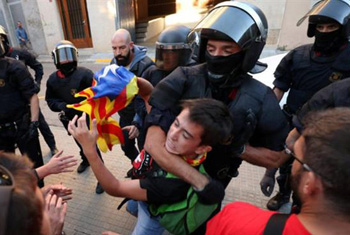
Catalonian politicians are sacked, the police are taken over by control from Madrid, and the elected President of Catalonia flees to Belgium, yet the hollow call of European democracy still resounds through the corrupt corridors of many of the EU’s power capitals.
Macron calls for a more democratic Europe, while women have their fingers broken by armed police in Catalonia for approaching a voting booth. “Democracy” in Europe is merely a word and it hinges on whether you stand with the current political system or not.

Posted November 27, 2017
______________________
______________________
 Volume I |
 Volume II |
 Volume III |
 Volume IV |
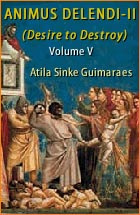 Volume V |
 Volume VI |
 Volume VII |
 Volume VIII |
 Volume IX |
 Volume X |
 Volume XI |
 Special Edition |


